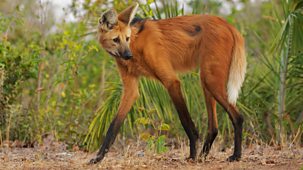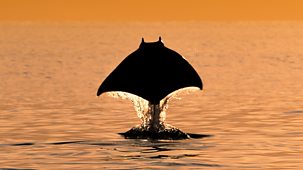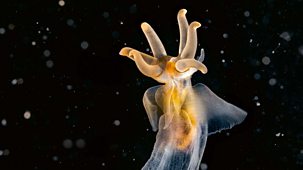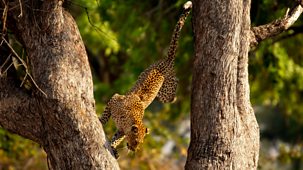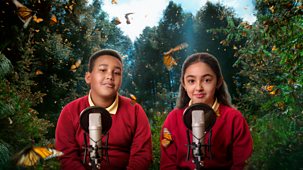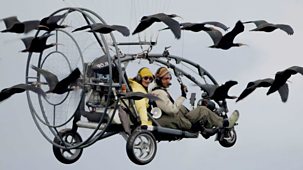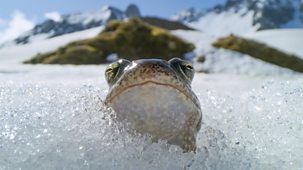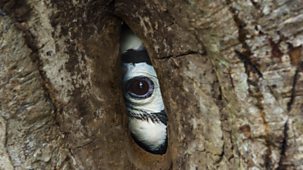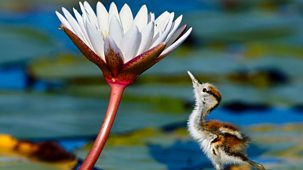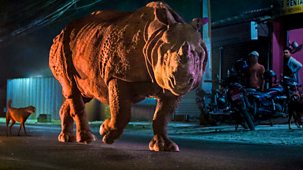
Series 1: 7. Human
The human world, from our cities to our fields, has spread to every corner of the globe. Wildlife must now adapt to a vastly altered landscape… and contend directly with us.\n \nSome animals are meeting this challenge head-on and thriving. In Bali, long-tailed macaques have learned to steal tourists’ most precious items and then use them to barter with temple staff for their favourite food. The older males simply won’t give you back your phone unless they get what they’re after. \n\nFor many animals living alongside us, it pays to keep a low profile. Tawny frogmouths are masters of camouflage, and in Melbourne, Australia, they are preyed upon by pet cats. Nevertheless, frogmouths are doing well here because the streetlights help them find their prey, and in many parts of the city they are now found in a higher density than in the surrounding countryside.\n \nSome animals are so bold, they don’t even try to hide. Rhinos walk through the streets of Sauraha, Nepal, simply to reach food on the other side of town. In Lake Tahoe, USA, black bears head right to the centre of town in search of food. Ahead of hibernation, it is crucial to put on as much weight as possible. The rich food these city bears can find in the dumpsters means that they are up to 50 per cent heavier than their country cousins. Some enterprising individuals have gone a step further. They have worked out that a simple push on a door can lead them into a room stacked high with food. Quite a surprise for someone popping into the shop to buy a snack. \n\nFor wildlife, part of the challenge is to keep up with us. Pavement ants are the most common ant in New York City, outnumbering New Yorkers by 1,000 to 1. The secret to their success is their digestive system, which has been able to keep pace with the constantly changing human diet. Ninety per cent of what they eat now comes from human food. On Broadway Avenue alone, they eat the equivalent of 60,000 hotdogs a year. \n \nLife is not so straightforward for animals that are feared or persecuted by humans. Snakebites cause an estimated 60,000 human deaths every year in India alone, but in one Indian village, venomous cobras are seen hunting inside peoples’ houses. Remarkably, scientists believe that this co-existence has led to a change in the snakes’ behaviour. They move more slowly and are less likely to strike when disturbed. \n \nHowever, when animals come into the human world to compete for resources, it often leads to conflict. In Kenya, once the sun has set, African elephant bulls venture to fields of tomatoes to gorge. It’s a dangerous job for the farmers trying to repel the largest land animals on the planet.\n \nWildlife that eat the same food as humans doesn’t always result in competition. Humpback whales off the coast of Vancouver Island inhabit waters that have been overfished. You would think that their presence would reduce fish stocks even further, but astonishingly the opposite is thought to be happening. It is all because of the iron in the whales’ poo! It fertilises the ocean here and feeds the phytoplankton, which is the basis of the food chain. The fish feed on the growing phytoplankton population and, even though the whales are feasting on them, their numbers are predicted to increase. \n \nNot only do the whales, and their poo, play an important role in restoring the ecosystem, but they also combat climate change. The phytoplankton photosynthesise, taking carbon out of the atmosphere, just like trees do. Thanks to whale poo, their numbers grow to such an extent that each great whale has the same impact as planting 30,000 trees! \n \nAlthough some species are managing to thrive in the human world, in many parts our actions are putting unprecedented pressure on wildlife. Our fates, however, are closely intertwined. If the natural world is not protected, it could be devastating for all of us. The major challenge will be reimagining the way we live on this planet to find ways to protect all life on earth.
Source: BBC 1
Most recent episodes of Planet Earth III
Planet Earth Iii
Series 1: 3. Deserts And Grasslands
In the baked Namib desert, a pair of ostriches raise their family in the searing heat to keep them safe from predators – but time is ticking as the chicks begin to hatch. ...
30-03-2025
BBC 1
Planet Earth Iii
Series 1: 2. Ocean
Much of our world remains virtually unexplored because most of it is under water. The ocean covers two-thirds of the planet and is home to 80 per cent of all animal life. Yet we ...
22-03-2025
BBC 1
Planet Earth Iii
Series 1: 1. Coasts
Sir David Attenborough explores the dangerous frontiers created by the world's coasts, where animals fight for survival amidst constant change.\n\nOn South Africa’s Robber ...
16-03-2025
BBC 1
Planet Earth Iii
Series 1: Wonders Of Nature
This special episode brings together highlights from the series, from hidden forests and turbulent coasts to vast, unexplored deserts. \n\nWe begin in the oldest desert on earth ...
03-01-2025
BBC 1
Planet Earth Iii
Narrated By Kids
This special Earth Day episode of Planet Earth III is narrated by schoolchildren across the UK. Because you don’t have to be Sir David Attenborough to become a voice for n ...
06-05-2024
BBC 1
Planet Earth Iii
Series 1: 8. Heroes
All around the world, there are heroes on the frontline of conservation who are risking everything in the fight to save wildlife. Sir David Attenborough introduces this programm ...
30-01-2024
BBC 1
Planet Earth Iii
Series 1: 7. Human
The human world, from our cities to our fields, has spread to every corner of the globe. Wildlife must now adapt to a vastly altered landscape… and contend directly with ...
23-01-2024
BBC 1
Planet Earth Iii
Series 1: 6. Extremes
David Attenborough reveals the extraordinary ways in which animals battle to survive the elements in a world of extremes - places where life exists on a knife edge. From mountai ...
16-01-2024
BBC 1
Planet Earth Iii
Series 1: 5. Forests
Sir David Attenborough journeys into the hidden world of forests, where lives are entwined in the most unexpected of ways. From the temperate rainforests of Canada, where rarely ...
09-01-2024
BBC 1
Planet Earth Iii
Series 1: 4. Freshwater
Fresh water is the lifeblood of planet Earth and the stage for extraordinary animal dramas. \n\nIn the heart of the Costa Rican rainforest, a little-known spectacle unfolds abov ...
02-01-2024
BBC 1
Most popular episodes of Planet Earth III
Planet Earth Iii
Series 1: 3. Deserts And Grasslands
In the baked Namib desert, a pair of ostriches raise their family in the searing heat to keep them safe from predators – but time is ticking as the chicks begin to hatch. ...
30-03-2025
BBC 1
Planet Earth Iii
Series 1: 2. Ocean
Much of our world remains virtually unexplored because most of it is under water. The ocean covers two-thirds of the planet and is home to 80 per cent of all animal life. Yet we ...
22-03-2025
BBC 1
Planet Earth Iii
Series 1: 5. Forests
Sir David Attenborough journeys into the hidden world of forests, where lives are entwined in the most unexpected of ways. From the temperate rainforests of Canada, where rarely ...
09-01-2024
BBC 1
Planet Earth Iii
Series 1: 4. Freshwater
Fresh water is the lifeblood of planet Earth and the stage for extraordinary animal dramas. \n\nIn the heart of the Costa Rican rainforest, a little-known spectacle unfolds abov ...
02-01-2024
BBC 1
Planet Earth Iii
Series 1: 6. Extremes
David Attenborough reveals the extraordinary ways in which animals battle to survive the elements in a world of extremes - places where life exists on a knife edge. From mountai ...
16-01-2024
BBC 1
Planet Earth Iii
Series 1: 7. Human
The human world, from our cities to our fields, has spread to every corner of the globe. Wildlife must now adapt to a vastly altered landscape… and contend directly with ...
23-01-2024
BBC 1
Planet Earth Iii
Series 1: 8. Heroes
All around the world, there are heroes on the frontline of conservation who are risking everything in the fight to save wildlife. Sir David Attenborough introduces this programm ...
30-01-2024
BBC 1
Planet Earth Iii
Narrated By Kids
This special Earth Day episode of Planet Earth III is narrated by schoolchildren across the UK. Because you don’t have to be Sir David Attenborough to become a voice for n ...
06-05-2024
BBC 1
Planet Earth Iii
Series 1: Wonders Of Nature
This special episode brings together highlights from the series, from hidden forests and turbulent coasts to vast, unexplored deserts. \n\nWe begin in the oldest desert on earth ...
03-01-2025
BBC 1
Planet Earth Iii
Series 1: 1. Coasts
Sir David Attenborough explores the dangerous frontiers created by the world's coasts, where animals fight for survival amidst constant change.\n\nOn South Africa’s Robber ...
16-03-2025
BBC 1


